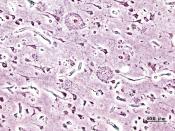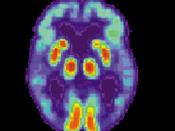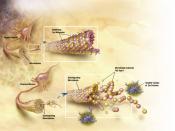Alzheimer's Disease
Alzheimer's Disease (AD) is a chronic, degenerative disease that is characterized by the loss of cognition. AD that occurs before the age of 60 is known as pre-senile dementia. If AD occurs after the age of 60, it is known as senile dementia. AD accounts for more than 60% of all dementias (Taber's 81). AD is the "...process of mental wasting while motor functions remain intact" (Tyrer 215). Because of this mental wasting, AD in late stages tends to be more difficult for the family of an AD patient, rather then the patient themselves. Although the cause of AD is unknown, the risk factors include family history of dementia and old age.
There are three stages of AD progression. Stage I (mild dementia) is characterized by loss of short term memory and decreased judgment. Stage II (moderate dementia) includes difficulty with speech and language, personality changes, wandering, depression, paranoia and hallucinations.
In Stage III (severe dementia) the patient looses the ability to perform activities of daily living and requires 24 hour care (Taber's 82).
AD is diagnosed typically by eliminating other causes of dementia. In later stages of AD, an MRI may show a reduction in the size of the cortex (Treatment 4).
The major pathology of AD is the degeneration of cortical neurons. The enzyme acetyltransferose is decreased in the cortex. This decrease is linked with a reduction in available acetylcholine, an important neurotransmitter (Tyrer 215). This lack of acetylcholine is part of the cause of cognitive impairment. Nuerofibrillary tangles (twisted fragments of protein within nerve cells) and neuritic plaques (abnormal clusters of dead and dying nerve cells) also occur in patients with AD (Taber's 81).
The prognosis for patients with AD is unfortunate. Patients with AD eventually loose all ability to care for themselves. "Death normally...



Alzheimer's Disease
A pretty good short essay on Alzheimer's Disease. Easy to read, and few to no grammatical errors.
2 out of 2 people found this comment useful.